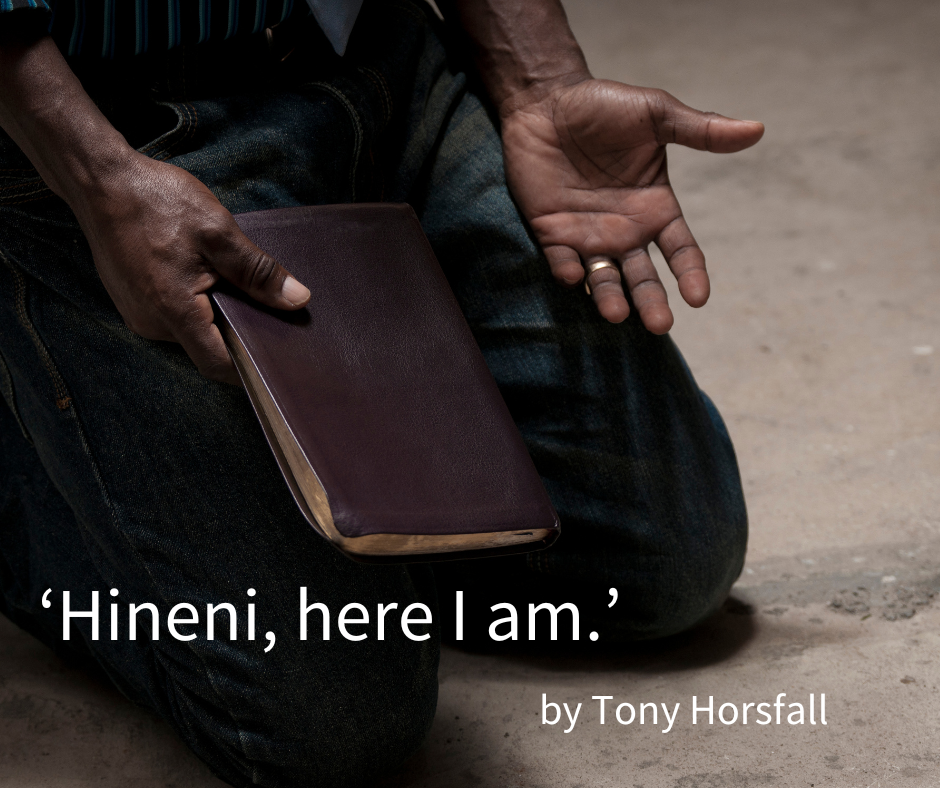‘Hineni, here I am.’ by Tony Horsfall

I grew up in a small mining village in Yorkshire, and as a child attended the local Methodist chapel where there was a thriving Sunday School. An annual event was the Young People’s Eisteddfod where children from throughout the circuit came together to recite Bible passages or sing Christian hymns in a sort of competition. I remember it was a nerve-wracking occasion, but still imprinted in my mind is the passage that I learned by heart one year – the story of the boy Samuel in the temple with Eli (1Samuel 3).
Over the years this simple story of how God called the boy Samuel to be a prophet has often come back to me. In particular, the words of Samuel’s response to Eli (and by implication, God) have stood out for me: ‘Here I am’. Three simple words that indicate a profound surrender to God. Even as a young boy, not yet sure of my faith, that truth came across to me.
‘Here I am’ is a translation of the Hebrew word hineni. It represents far more than a nod of the head and a curt ‘Here, sir’ to your form teacher during school registration. This is a word of deep response when one is fully present to the moment, aware that God is near. It communicates a total readiness to give oneself to him, an offer of total availability. It is a surrender of love, to Love.
Just a few years after taking part in the Youth Eisteddfod I had my first hineni moment. Now a teenager, I sat in the same village chapel and heard for the first time, as far as I remember, the gospel message – that Christ had died for me, offered to forgive my sins, and called me to follow him. With tears flowing down my cheeks I responded to the moment with my own ‘Here I am Lord’, offering myself to him as fully as I was able at such a young age.
Fast forward a few more years and another encounter with God, during a spell working during my summer holidays at a Christian residential centre. This time the call came not to salvation but to service. Was I willing to respond in obedience and follow his will for my life? Samuel’s story came to mind, and another opportunity to say, ‘Hineni, here I am.’
That led to some years studying at Bible College, where I met the girl who would become my wife. As we explored God’s will together we sensed God calling us to overseas mission. Another big moment of decision, but again the grace to surrender and offer ourselves to God to serve him in Malaysia. ‘Hineni, here we are Lord.’
And so the pattern has been established – call and obedience, presence and encounter, invitation and response. So many hineni moments in a lifetime of following God, surrendering to his loving call to follow wherever he leads. And always, after the heart-searching and struggle to yield, the blessing that comes with obedience, the joy of discovering that God’s will really is good, pleasing and perfect (Romans 12:2).
That’s a pattern that has continued at other times and in different ways until the present day. The pandemic and lockdown coincided for me with my wife’s terminal illness and her death in July 2020. Grieving has been intensified by lockdown, and the loneliness has been at times excruciating, but I have been brought back again to the place of surrender to Love as the only way forward. Sensing that God still has a plan and purpose for my life, I have returned again to the story of the boy in the temple. It has not been easy, but I have been given the grace to offer myself afresh to God, to say at this moment in my life, ‘Hineni, here I am Lord.’ Exactly what that means is still unfolding before me. It is both exciting and scary.
And what of you? Where are you on your journey of faith? What changes has the pandemic brought to your life, and how is God at work in your life? What new adventure awaits you? What invitation is God giving to you? How will you respond?
By Tony Horsfall

Tony Horsfall is a well-respected author and retreat leader who has a lifetime’s experience in mentoring others, including church leaders and missionaries, both in Britain and overseas. His book Deep Calls to Deep was reissued in 2021 because of its emphasis on lament and its relevance post pandemic. Grief Notes is a companion volume, describing as it does the author’s own experience of crying out to God from the depths.

